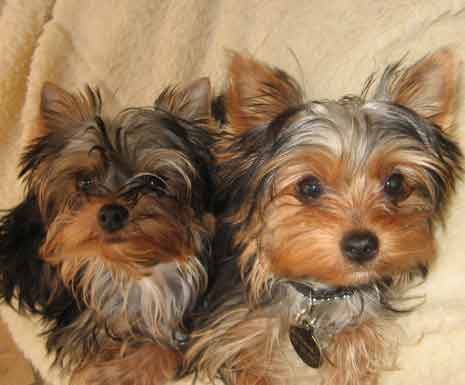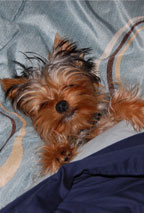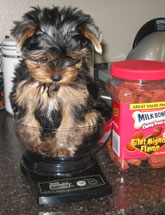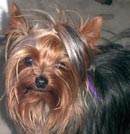CAREFUL OBSERVATION
Notice any unusual behavior or odd physical symptoms? Schedule a veterinarian exam before the condition worsens. Then call your Yorkie's breeder to report what is happening.
Remember: unless you're a veterinarian (or your dog is choking) don't try to treat your dog yourself.
For some reason pets are ingesting more poisons than in the past. Perhaps there are more products around these days that are made with poisonous ingredients, or perhaps with our busy lives we forget to put things away in a safe place. Whatever the reason, there is a significant increase in the number of pets dying each year from poisonous substances.
If your Yorkie does eat something that you think might be toxic, immediately call theAnimal Poison Control Center Hotline (888) 426-4435
and then contact your veterinarian or emergency vet hospital.
TOXIC TABLE FOODS
- CHOCOLATE
- GRAPES AND RAISINS
- ARTIFICIAL SWEETENERS
- GARLIC AND ONIONS
- CAFFEINE AND ENERGY DRINKS
TOXIC HOUSEHOLD PRODUCTS
Antifreeze is very toxic and even small amounts can cause kidney damage that is life-threatening. Keep these things in mind when working with antifreeze:
- Clean up spills immediately
- Check for leaks under your car regularly
- Store antifreeze in clearly marked containers that are sealed and out of reach of your pets
- Never allow your pet into the area where you are draining radiator fluid from your vehicle
- Consider using products containing propylene glycol, which is a less toxic form of antifreeze instead of those containing ethylene glycol.
The list of common household substances that could be harmful if ingested by your Yorkie is too long for this page. Please visit the ASPCA Animal Poison Control Center for a complete list.
TOXIC GARDEN PLANTS
The short list of common plants that cause serious side effects and may even result in death:
-
Grapes
- Sago Palm
- Oleander
- Lilies
- Tulip and Narcissus (Daffodil) Bulbs
- Yew
- Azaleas and Rhododendrons
- Castor Bean
- Cyclamen
- Kalanchoe
The list of common garden plants that could be harmful if ingested by your Yorkie is too long for this page. Please visit the ASPCA Animal Poison Control Center for a complete list.
SAFE EXPOSURE TO OTHER DOGS
Until your Yorkie puppy is fully vaccinated, be sure it is isolated from other dogs. Then you will want to sign up for puppy socialization classes, or make play dates with older, well-trained dogs. Be sure other dogs are no more than 3 times your puppy's weight. Pet stores are also a great place for dog interaction. However, keep your puppy away from animals that are being sold at the pet store. Rescue dogs may have behavioral and/or health issues that could endanger a Yorkie puppy.
SOCIALIZATION
Between 12 and 16 weeks of age is the "sweet spot" for socializing your Yorkie puppy. As soon as your new puppy is settled in your home, you should begin socialization and obedience training. Socializing your Yorkie is an important step in their healthy development. Dogs that are not properly socialized can become shy or fearful of people or other dogs. It is important to introduce puppies to new sights, sounds and places every day. Some experts use the “Rule of Seven” to begin socializing puppies. That is, between 12 and 16 weeks of age, you introduce your puppy to seven new kinds of people, seven new types of surfaces, seven new foods, seven new sounds, and seven new places.
HOT WEATHER
The dangers of extreme heat for humans also apply to Yorkies.
Heat stroke is an essential problem to look out for. Signs of heat stroke include excessive panting, staggering, seizures, bloody diarrhea or vomiting, coma, body temperatures above 104F, and dark or bright red tongue and gums. Take your Yorkie to the veterinarian immediately if you suspect heat stroke. Use cool water, not ice cold, to cool down. Offer ice cubes to lick until you can reach the veterinarian.
CHOKING:
Choking is an emergency! Action must be taken immediately.
Signs of choking:
-
Sudden difficulty breathing
- Blue lips and tongue
- Rubbing face on ground
- Pawing at mouth
- Bulging eyes
- Choking or gagging sound
If airway obstruction is due to a foreign object, it must be cleared immediately. Do not wait for veterinarian assistance. Clear airway and perform Yorkie Heimlich immediately (see right column).
When your Yorkie stops choking he will probably bite you, but I assure you, you will not mind!

Dusty and Twigs resting up after a romp 1/20/08.






